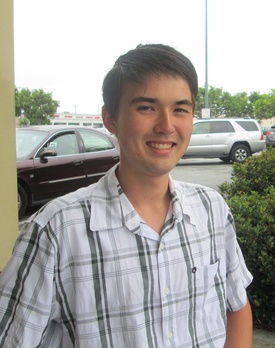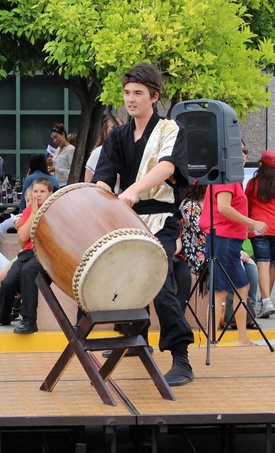A childhood spent traveling back and forth between Japan and the US
"I've never thought of myself as Japanese American. I see myself as Japanese and American at the same time," said Noah Freeman (19), a student at UC Riverside.
Noah was born in 1995 to his Japanese mother, who was studying English in Colorado, and his American father, who was a student at the time. However, his father decided to join him after graduating from college, and his mother returned to her hometown in Yamato City, Kanagawa Prefecture, with Noah, who was still a baby, as she decided to join him. After living with his grandparents until he graduated from kindergarten, Noah returned to the United States with his mother and began living with his father in Colorado.
"I was a shy person, and there was also the language barrier, so I had a hard time blending in with the locals. When I was in the first grade, the class was given the task of drawing a picture diary, but I couldn't understand what the teacher was saying, so I drew a picture of the Japanese anime character Crayon Shin-chan and handed it in without writing anything. When I did that, the teacher scolded me severely."
Although Noah dreamed of returning to Japan someday, he moved from Colorado to Torrance, California at the end of his second year. He gradually became accustomed to life in America. "Colorado was a white society, but Torrance had a lot of Asians, including Japanese, so it was easy for me to fit in."
Noah was not content there either, and when his father was hired by the army, the family moved to Zama, where he was stationed.
"I was happy to be back in Japan, but the environment on the base was a bit unique. Quite a few students at the school on the base were considering joining the military after graduation, and hearing those stories was both refreshing and intriguing to me. If you join the military, the government will cover your university tuition fees, and best of all, your posting location will change every three years. That way, you'll have the opportunity to experience traveling the world, to places like Europe and America, and I began to imagine my own future."
However, when he was in the 11th grade, his father was transferred to California again, so the family returned to the U.S. After graduating from high school in Torrance, he went on to study at UC Riverside.
Multiple personalities?
How does Noah, who has lived in both Japan and the United States, view his identity now? As mentioned at the beginning of this article, he says he has never thought of himself as Japanese.
"To be honest, sometimes I wonder if I have multiple personalities. When I speak English, I am very direct in my expressions. But when I speak Japanese, I can't do that. I am reserved and have a so-called 'Japanese' personality."
Now that he is approaching his third year at university, he has two things he is passionate about outside of his studies. One of them is Japanese drumming.
"When I entered college, I joined a Japanese drumming group out of curiosity. As I had more opportunities to perform in various places, I began to find joy in entertaining people. If possible, I would like to create an opportunity for collaboration between Japanese drumming groups in Los Angeles in the future."
The other is the activities of a group organized for Japanese-English bilingual students. They founded an organization called Presidio (meaning "to serve" in Spanish) to provide clients with interpretation and translation services from Japanese to English and from English to Japanese, hoping to gain practical experience before entering the workforce. Noah has already started working as a translator, but he wants to share his experience with others by recruiting members.
"I plan to actively recruit people and market to companies. It may be premature to start now, as we don't have many people in attendance yet, but by being the founder and recruiting people with bilingual skills and leadership skills, I want the organization itself to continue even after I leave the company and enter the workforce."
Thanks to my Japanese grandmother
Noah has been accepted to transfer from UC Riverside to the University of Southern California since January 2016. "This was the recommendation of my Japanese grandmother. She was very education-conscious, and even after we moved to the US in my first year, she continued to send me Kumon workbooks. At the time, I really didn't know the true meaning of 'parents don't know their children', and I didn't study with the workbooks very often, but now I am truly grateful for my grandmother's love. I hadn't even thought about transferring myself, but my grandmother strongly encouraged me, saying, 'If you have a chance to transfer, at least send your application to USC,' and that's what got me started. I can't thank my Japanese grandparents enough for supporting me both materially and emotionally."
Noah's dream is to become a certified public accountant after graduating from university. "I want to become a CPA who can use my Japanese and English skills to bridge the gap between Japan and the United States," he says.
Finally, I asked what he thought about the fact that there are quite a few second-generation Japanese who grow up in international marriage families or Japanese families living in the United States and are in an environment where they should have learned both Japanese and English, but end up giving up on learning Japanese.
"It's not something that should be said about other people, and since just studying at a local school is difficult, I think it's inevitable that they will only study English. Still, I feel that it's a waste to give up on the language so soon, and that they might end up regretting it."
At the very least, he is not giving up on either language, and is trying to make use of his Japanese-American identity and his bilingualism in his future work. We cannot help but wish him success in his activities at the Presidio, which will serve as a stepping stone to that end.
© 2015 Keiko Fukuda







